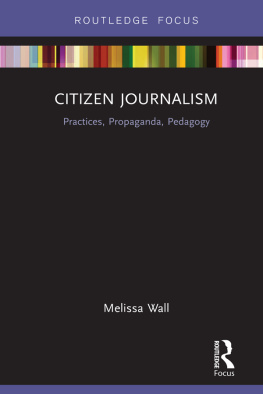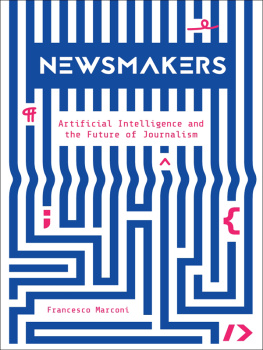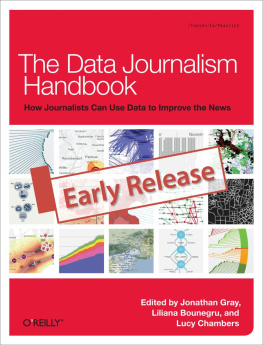Journalism in an Era of Big Data
Big data is marked by staggering growth in the collection and analysis of digital trace information regarding human and natural activity, bound up in and enabled by the rise of persistent connectivity, networked communication, smart machines, and the internet of things. In addition to their impact on technology and society, these developments have particular significance for the media industry and for journalism as a practice and a profession. These data-centric phenomena are, by some accounts, poised to greatly influence, if not transform, some of the most fundamental aspects of news and its production and distribution by humans and machines.
What such changes actually mean for news, democracy, and public life, however, is far from certain. As such, there is a need for scholarly scrutiny and critique of this trend, and this volume thus explores a range of phenomenafrom the use of algorithms in the newsroom, to the emergence of automated news storiesat the intersection between journalism and the social, computer, and information sciences. What are the implications of such developments for journalisms professional norms, routines, and ethics? For its organizations, institutions, and economics? For its authority and expertise? And for the epistemology that underwrites journalisms role as knowledge-producer and sense-maker in society? Altogether, this book offers a first step in understanding what big data means for journalism. This book was originally published as a special issue of Digital Journalism.
Seth C. Lewis is the inaugural Shirley Pap Chair in Electronic and Emerging Media in the School of Journalism and Communication at the University of Oregon, Eugene, OR, USA. He is also a visiting fellow with the Information Society Project at Yale Law School, New Haven, CT, USA. His widely published research explores the digital transformation of journalism, with a focus on the humantechnology interactions and media innovation processes associated with data, code, analytics, social media, and related phenomena. He is co-editor of Boundaries of Journalism: Professionalism, Practices, and Participation (Routledge, 2015), and is on the editorial boards of New Media & Society, Social Media + Society, Digital Journalism, and Journalism & Mass Communication Quarterly, among other journals. He is a two-time winner (2013 and 2016) of the Outstanding Article of the Year in Journalism Studies Award, from the Journalism Studies Division of the International Communication Association.
Journalism Studies: Theory and Practice
Series editor: Bob Franklin, Cardiff School of Journalism, Media and Cultural Studies, Cardiff University, UK
The journal Journalism Studies was established at the turn of the new millennium by Bob Franklin. It was launched in the context of a burgeoning interest in the scholarly study of journalism and an expansive global community of journalism scholars and researchers. The ambition was to provide a forum for the critical discussion and study of journalism as a subject of intellectual inquiry but also an arena of professional practice. Previously, the study of journalism in the UK and much of Europe was a fairly marginal branch of the larger disciplines of media, communication and cultural studies; only a handful of Universities offered degree programmes in the subject. Journalism Studies has flourished and succeeded in providing the intended public space for discussion of research on key issues within the field, to the point where in 2007 a sister journal, Journalism Practice, was launched to enable an enhanced focus on practice-based issues, as well as foregrounding studies of journalism education, training and professional concerns. Both journals are among the leading ranked journals within the field and publish six issues annually, in electronic and print formats. More recently, 2013 witnessed the launch of a further companion journal Digital Journalism to provide a site for scholarly discussion, analysis and responses to the wide ranging implications of digital technologies for the practice and study of journalism. From the outset, the publication of themed issues has been a commitment for all journals. Their purpose is first, to focus on highly significant or neglected areas of the field; second, to facilitate discussion and analysis of important and topical policy issues; and third, to offer readers an especially high quality and closely focused set of essays, analyses and discussions.
The Journalism Studies: Theory and Practice book series draws on a wide range of these themed issues from all journals and thereby extends the critical and public forum provided by them. The Editor of the journals works closely with guest editors to ensure that the books achieve relevance for readers and the highest standards of research rigour and academic excllence. The series makes a significant contribution to the field of journalism studies by inviting distinguished scholars, academics and journalism practitioners to discuss and debate the central concerns within the field. It also reaches a wider readership of scholars, students and practitioners across the social sciences, humanities and communication arts, encouraging them to engage critically with, but also to interrogate, the specialist scholarly studies of journalism which this series provides.
Recent titles in the series:
Making Sense of Mediatized Politics
Edited by Jesper Strmbck and Frank Esser
The Future of Journalism in an Age of Digital Media and Economic Uncertainty
Edited by Bob Franklin
The Places and Spaces of News Audiences
Edited by Chris Peters
Theories of Journalism in a Digital Age
Edited by Steen Steensen and Laura Ahva
Journalism in an Era of Big Data
Cases, concepts, and critiques
Edited by
Seth C. Lewis
First published 2017
by Routledge
2 Park Square, Milton Park, Abingdon, Oxon, OX14 4RN, UK
and by Routledge
711 Third Avenue, New York, NY 10017, USA
Routledge is an imprint of the Taylor & Francis Group, an informa business
2017 Taylor & Francis
All rights reserved. No part of this book may be reprinted or reproduced or utilised in any form or by any electronic, mechanical, or other means, now known or hereafter invented, including photocopying and recording, or in any information storage or retrieval system, without permission in writing from the publishers.
Trademark notice: Product or corporate names may be trademarks or registered trademarks, and are used only for identification and explanation without intent to infringe.
British Library Cataloguing in Publication Data
A catalogue record for this book is available from the British Library
ISBN 13: 978-1-138-69203-9
Typeset in Myriad Pro
by RefineCatch Limited, Bungay, Suffolk
Publishers Note
The publisher accepts responsibility for any inconsistencies that may have arisen during the conversion of this book from journal articles to book chapters, namely the possible inclusion of journal terminology.
Disclaimer
Every effort has been made to contact copyright holders for their permission to reprint material in this book. The publishers would be grateful to hear from any copyright holder who is not here acknowledged and will undertake to rectify any errors or omissions in future editions of this book.







